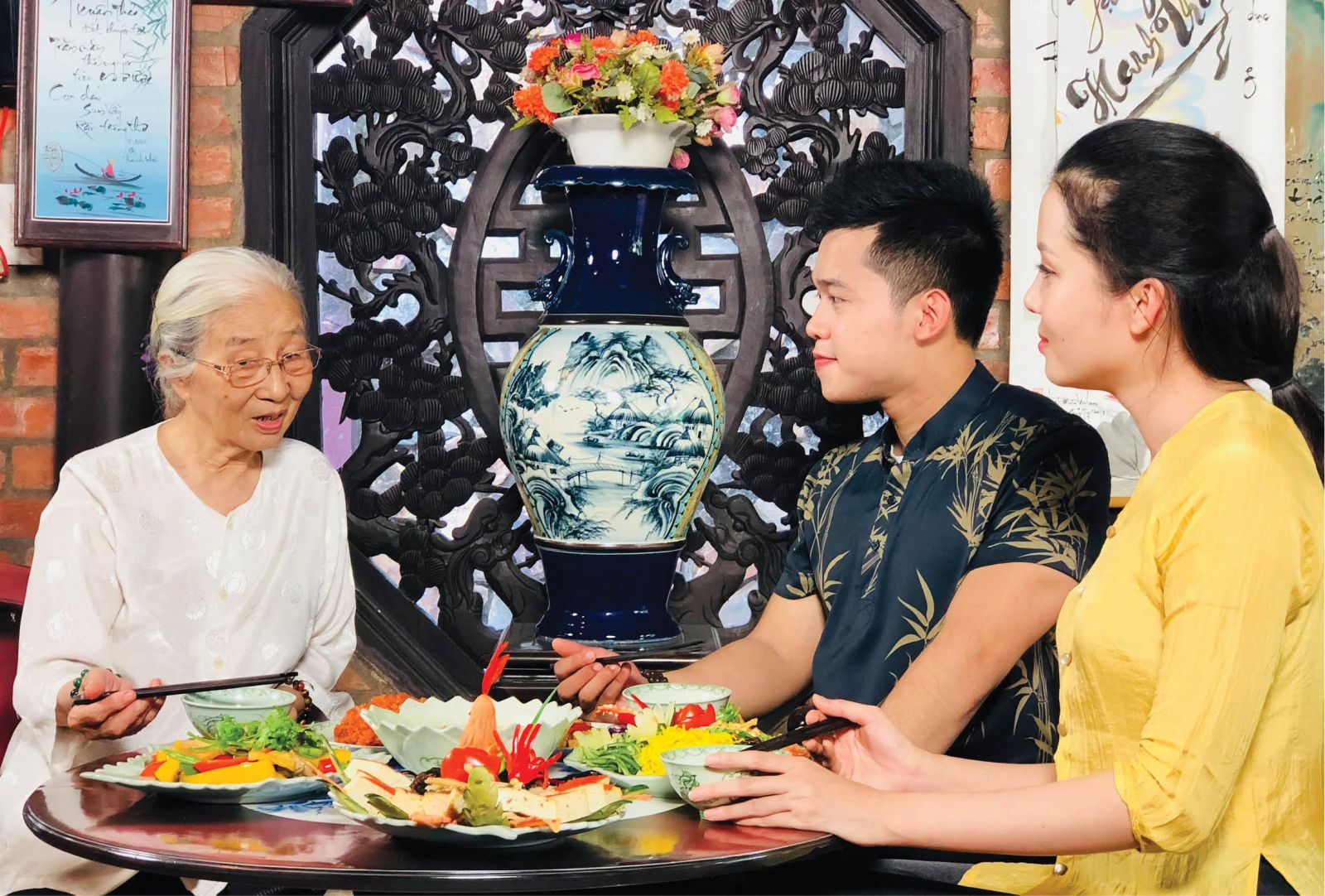
Mai Thi Tra is introducing Hue cuisine.
Respecting and honoring the heritage
Thua Thien Hue is the region with many cultural and historical values, especially the heritage, both tangible and intangible, recognized by UNESCO including the Complex of Monuments of Hue Former Imperial Capital, court music, royal poetry on architecture, the belief of mother goddesses’ worship, and hut card game in Central Vietnam. Well aware of the invaluable cultural heritage left by predecessors, leaders and people in Thua Thien Hue have been so far trying to honor, protect, conserve and promote it.
That can be seen through the conservation and repair of the Complex of Monuments of Hue Former Imperial Capital, changing it from its emergency period to sustainable development. The complex attracts up to 85% of visitor arrivals to Hue.
Many other national relics such as President Ho Chi Minh’s Memorial Houses at 112 Mai Thuc Loan St. and Duong No Village, Phan Boi Chau’s Memorial House, Great General Nguyen Chi Thanh’s Memorial Area, etc., have been conserved, repaired, and embellished.
Intangible cultural values such as royal art and folk art, Hue singing, traditional festivals including Le hoi cau ngu (Fishing Festival), Nam Giao Offering Festival, Xa Tac Offering Festival, etc., have been surveyed, researched and collected.
Hue is also a city of festivals. Hue Festival has become a brand name with the participation of many countries. Traditional garden houses, the ancient village of Phuoc Tich, Lang Co Bay, Bach Ma National Park, etc., have been protected, conserved and promoted by Thua Thien Hue Province.
According to Dr. Tran Dinh Hang, head of the National Culture and Art Institute in Hue, Thua Thien Hue has done many things to build Hue into a cultural center. The system of landscape ecology is identified and honored. Physical interference is regulated to be in harmony with the landscape and the spirit of a garden city.
According to the researcher Nguyen Xuan Hoa, in the effort to become a festival city, Hue has succeeded and highlighted traditional artistic values. Together with new forms of art, tuong (classical opera), court music, Hue singing, royal dancing, festivals, folklore games, etc., have been recovered, making the cultural life of Hue become vivid. Those activities at the same time help evoke creativity in the circles of artists and intellectuals, and the people.
According to Dr. Phan Thanh Hai, Director of the Culture and Sports Department, such cultural achievements give rise to the issue of the 54th Resolution saying that the right way to develop Hue is to base on the cultural heritage. It also shows the interest of the Party in the Former Imperial Capital of Hue _ a center of culture, education, and science not only of the country but also of the area and the world.
Specific strategies
According to Dr. Tran Dinh Hang, in order to build Hue into a special cultural center, it is necessary to identify the unique identity of Hue. If not, we would be at a loss before such abundant heritage with so many cultural layers and facets.
“It is necessary to identify the exquisite spirit of Hue, which is living in harmony with nature. That spirit can be seen through such simple things as a bowl of mussel rice or mixed greens soup, a feast of salt, or through architecture, sculpture, painting, etc.,” said Dr. Hang.
According to Nguyen Xuan Hoa, Hue needs to recover its status, being a cultural center which at the same time protects traditional values and develops new ones which are up to date and tempting to the young. It requires big efforts with not only the investment of the government but also policies that encourage investors.
According to Dr. Phan Thanh Hai, in order to make Hue a center of culture, we still have much to do. First of all, we need to respect the heritage and draw up specific and appropriate plans in accordance with a municipality in the future. We need proper planning to maintain the heritage and landscape so that the development is right and sustainable.
Another important thing is proper investment for the heritage culture and preparing jurisdiction which is lacking or incompatible, especially basic urban institutions such as theatres, museums, libraries, expo centers, etc., with a view to exploiting and promoting the special cultural heritage available and bettering the spiritual life for the people and developing tourism and services. The investment should be in a large and lasting scale so that it is still applicable after 50-100 years.
Besides, there should be a policy for training human beings. Activities should be socialized so that organizations, both inside and outside, can participate in the process of conserving and promoting the value of the cultural heritage.
Story and photo: MINH HIEN